ICLEI
World Congress 2024
Transformando compromissos em ação
Transforming commitments into action
Transformemos compromisos en acción
18-21 June • São Paulo, Brasil
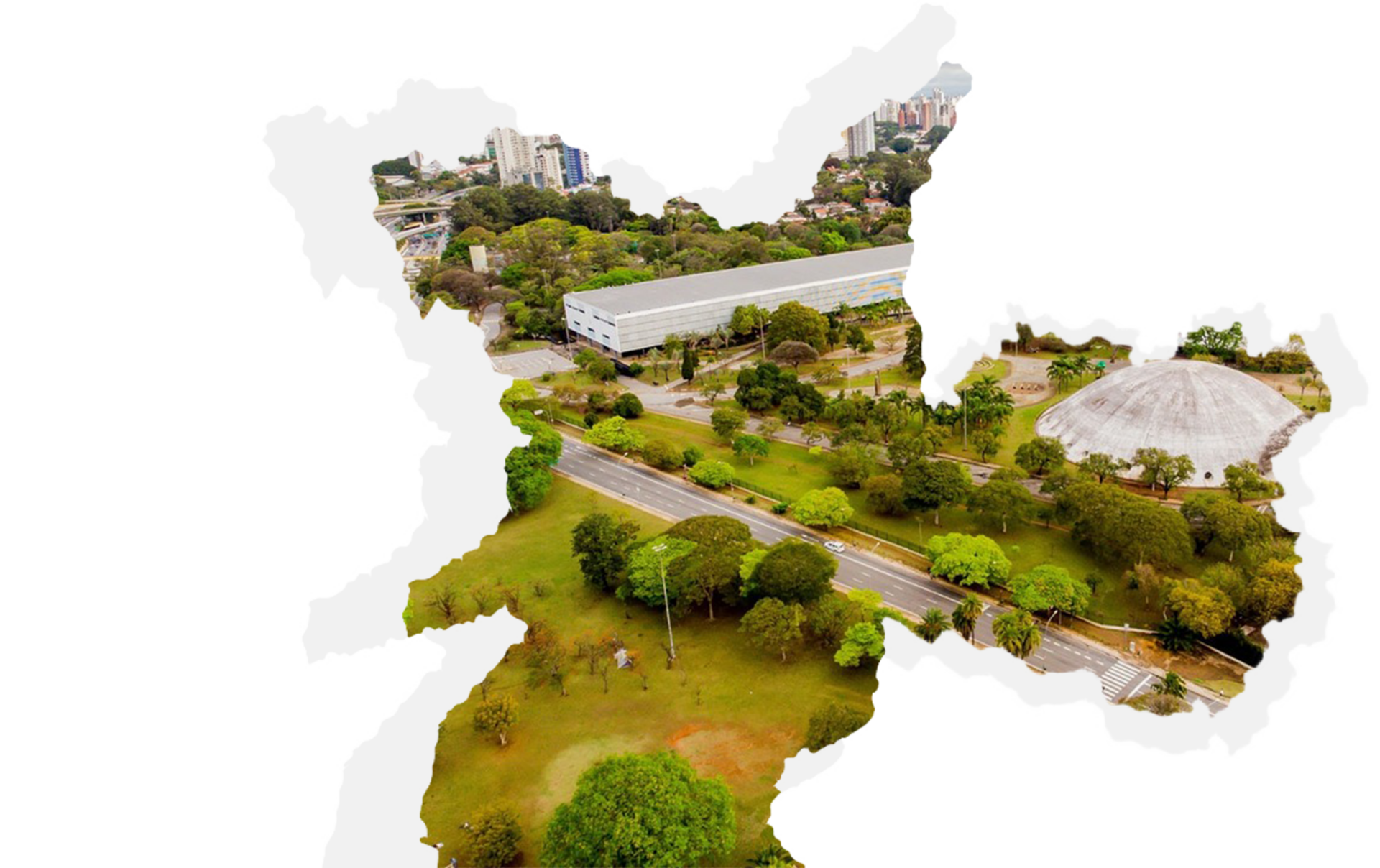
The ICLEI World Congress 2024 Recap
The ICLEI World Congress 2024
The ICLEI World Congress 2024, hosted by the City of São Paulo, Brazil, focused on advancing sustainable urban development and equitable adaptation to local and regional challenges. Running from 18 – 21 June, this year’s Congress was a journey of reflection and forward-looking vision, emphasizing the critical challenges and opportunities facing cities, towns, and regions due to rising global risks and changes.
Over 1500 local and regional government representatives, urban practitioners, researchers and stakeholders joined us to exchange with and inspire one another on the best practices in sustainable urban development, brought to life by the City of São Paulo as our 2024 host. São Paulo also generously ensured there was no cost for participation.
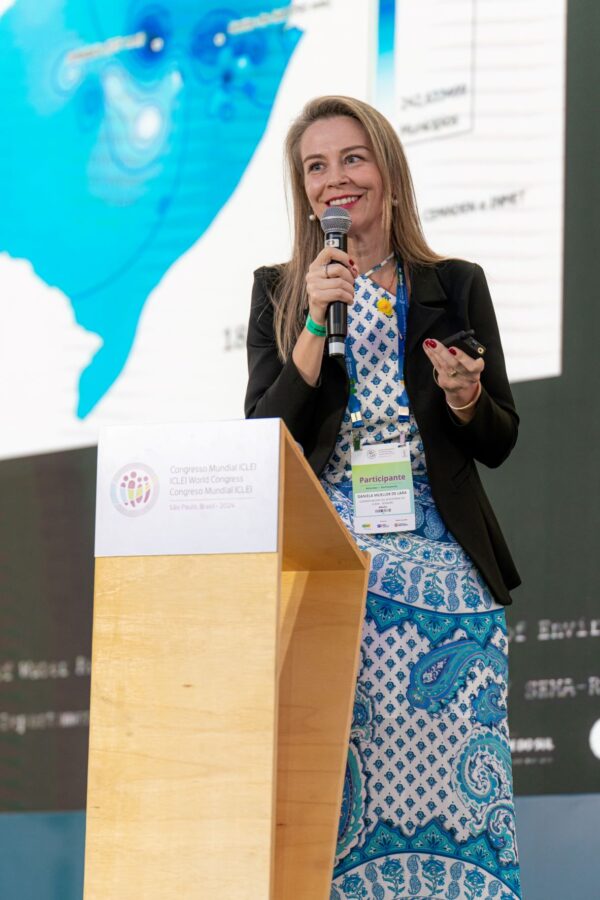
Key Announcements from ICLEI World Congress 2024
ICLEI President Makes Debut in New Role
The Congress welcomed ICLEI’s newly elected President, Katrin Stjernfeldt Jammeh, Mayor of Malmö, who presented the organization’s Strategic Vision 2024-2030, presenting ambitious goals and pathways to enhance urban sustainability globally.
ICLEI’s Strategic Vision 2024-2030 Release
The Power of Our Network in a Changing World – ICLEI’s strategic vision for the next three years – sets a way towards the transformation to sustainable development. This vision, set forth in the voice of the local and regional governments of the ICLEI network, creates a picture of what is needed for a truly sustainable urban world.
ICLEI Gender Declaration announced
ICLEI’s new Gender Declaration marks a significant commitment to embedding gender equity into the organization’s core mission. This declaration will serve as a guiding framework for ICLEI’s network of over 2,500 local and regional governments, focusing on empowering women, addressing gender-specific challenges, and fostering inclusive governance and planning. The announcement highlighted the critical need for gender-responsive urban planning to ensure equitable benefits for all genders, emphasizing the importance of inclusive and equitable urban development practices.
Urban Infrastructure Insurance Facility Project (UIIF) announced first seven city signatories
The Urban Infrastructure Insurance Facility (UIIF) was launched to enhance urban resilience against natural hazards with innovative insurance solutions. Seven cities from Mexico, Brazil, Jamaica, and Honduras—Curitiba, Porto Alegre, Recife, Reynosa, Mérida, Tegucigalpa, and Kingston—are the first to join. Funded by KfW Development Bank on behalf of the German Federal Ministry for Economic Cooperation and Development (BMZ), UIIF helps cities measure risks and provides tailored insurance solutions. This initiative is vital for mitigating natural disaster disruptions and fostering sustainable urban development in Latin America and the Caribbean, setting a global example for urban leaders.
Cities and Regions Biodiversity Summit announced for the Biodiversity COP in Cali, Colombia
The 8th Summit for Subnational Governments and Cities, an official parallel event to Convention on Biological Diversity COP16, will take place on 26 October 2024 in the Blue Zone at the CBD COP in Cali, and is part of a 3-day program from 25-27 October. Announced by ICLEI and the City of Cali at the Congress, the Summit will continue a proud tradition, being the eighth such event since the first Summit convened 14 years ago.
100% Renewables Roadmap Project launched three 100% renewable roadmaps
ICLEI, in collaboration with the governments of Avellaneda (Argentina), Kisumu County (Kenya), and West Nusa Tenggara Province (Indonesia), unveiled tailored roadmaps to achieve 100% renewable energy by 2050. These customized plans, adapted to each region’s specific needs and resources, highlight the proactive leadership of cities and regions in the global energy transition. The project is funded by the German Federal Ministry for Economic Affairs and Climate Action (BMWK) through the International Climate Initiative (IKI).
Call to national associations of local governments to support CHAMP and multilevel climate action
Mayor Katja Dörner, City of Bonn, Germany, and chair of the Climate Action Governance Portfolio for ICLEI’s Global Executive Committee announced a call-to-action inviting all ICLEI leaders to proactively approach their national governments and national associations of local governments for multilevel NDCs by 2025, building on COP28 outcomes and CHAMP initiative, COP28’s Coalition for High Ambition Multilevel Partnerships for Climate Action, which has been signed by 72 countries and is an effort intended to enhance cooperation with subnational governments in financing, implementation, and the monitoring of climate strategies. Leaders were also invited to report their progress at the annual Daring Cities Forum. This followed an announcement on the first day of the Congress that Frente Nacional de Prefeitas e Prefeitos (FNP) – Brazil’s national association of cities – released a letter of commitment (PT) in which mayors pledged their support for CHAMP. This was followed by a similar resolution by the United States Conference of Mayors later in the week.
ICLEI and Climate Bonds Initiative partner to boost sustainable development projects
ICLEI and the Climate Bonds Initiative (CBI) announced a strategic partnership within the framework of the Transformative Actions Program (TAP). This collaboration aims to catalyze sustainable development by linking high-impact subnational climate projects with essential financial resources and expertise.
New Climate Compliance Partnerships
ICLEI launched partnerships with the governments of Piauí and São Sepé (RS) for Climate Compliance plans, and with Itabirito (MG) for a Climate Compliance plan. These partnerships aim to develop comprehensive strategies ensuring climate resilience and adherence to international climate standards, advancing ICLEI’s mission to foster sustainable urban development.
Youth Manifesto launched at the Opening Ceremony
The launch of the Youth Manifesto took place at the opening ceremony of the World Congress with the presence of Darlisson Ramos (Original Communities in the Amazon) and Henrique Barbosa (Institução A Vida no Cerrado). The document, prepared by young people from different institutions and volunteers, aims to promote a just transition, which prioritizes safeguarding human rights and promoting the political autonomy of young people with recommendations and actions for local governments and society in general. It implores local and regional governments to fulfill their responsibilities and cooperate to achieve sustainable, low-emission and climate-resilient development in their territories and globally, in line with the 2030 Agenda and the Paris Agreement with the priority of safeguarding human rights and promoting the political autonomy of young people.
ICLEI-Kaohsiung Smart and Net Zero Cities Community
The City of Kaohsiung announced a new partnership with ICLEI to host a community of practice for net zero cities for cities that are committed to a net zero by 2050 goal.
ICLEI – IFRC coastal cities initiative kick-off
Building on a global partnership announced at COP28, ICLEI and IFRC kicked off development of a coastal cities initiative for the Asia-Pacific, Africa and Latin America regions, to reduce risks for coastal cities and nurture resilience.
New contributors to the Local and Subnational Governments Coalition to end plastics pollution
In April 2024, with the Government of Quebec, Government of Catalonia, UCLG, and further partners, ICLEI launched the Local and Subnational Governments Coalition to End Plastic Pollution. The purpose of the Coalition is to ensure that an ambitious but practical instrument is collectively shaped with local and subnational governments and ensures the participation and resourcing of local and subnational governments to contribute to ending plastic pollution. During the Congress, cities and subnational governments from five continents added their voice to the Coalition.
Brazilian National Urban Afforestation Plan announced
ICLEI, the Brazilian Ministry of Environment and INESC R&D Brazil, together with various Federal Universities and the Brazilian Society of Urban Afforestation signed a partnership that will be a significant milestone for urban afforestation in the country towards greener, more resilient, sustainable and healthier cities. Among many initiatives, they will collaborate in the preparation of the National Urban Afforestation Plan, in a participatory process involving various sectors of society, to expand biodiversity and ecosystem services in Brazilian cities.
A growing network of local and regional governments
Since June last year, 133 cities and regions have joined ICLEI. While in São Paulo Istanbul Metropolitan Municipality decided to join ICLEI, making the city the very first new ICLEI Member emanating from the Congress.
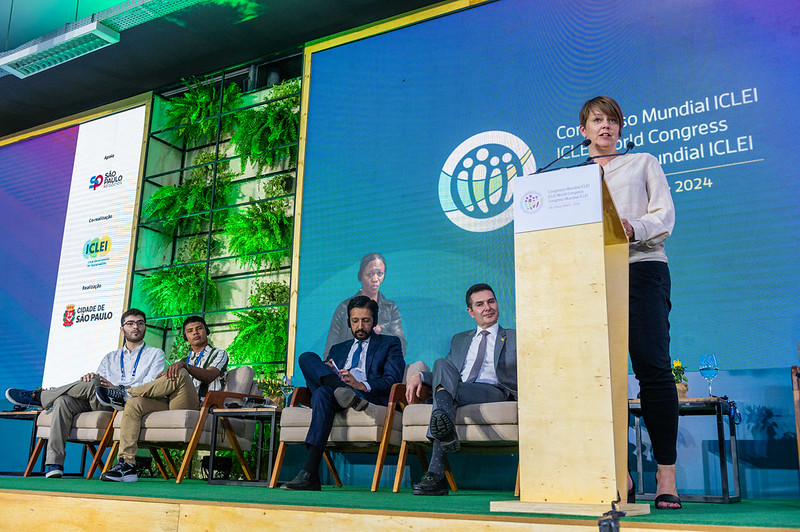
ICLEI World Congress 2024 demonstrated the collective power of cities and regions to address sustainability
Over 1,500 urban leaders from 96 countries addressed critical issues on climate action and urban resilience, setting the stage for city and region significance at COP30 in Belém, Brazil in 2025. The event addressed critical issues in local climate and resilience action, multilevel governance, and the unique role of the Amazon region in global sustainability.
The Congress was the main event of the São Paulo Urban Summit, a week full of activities that highlight the fundamental role of cities. As Brazil officially assumes the presidency of the G20, replacing India, Brazilian cities will lead the U20, elevating the voices of urban centers at the heart of the G20 economies. The week also included the Metropolis Board of Directors Meeting, further reinforcing the importance of cities on the global stage.
We experienced firsthand the stories of local and regional leaders who are trailblazers in sustainability within their communities.
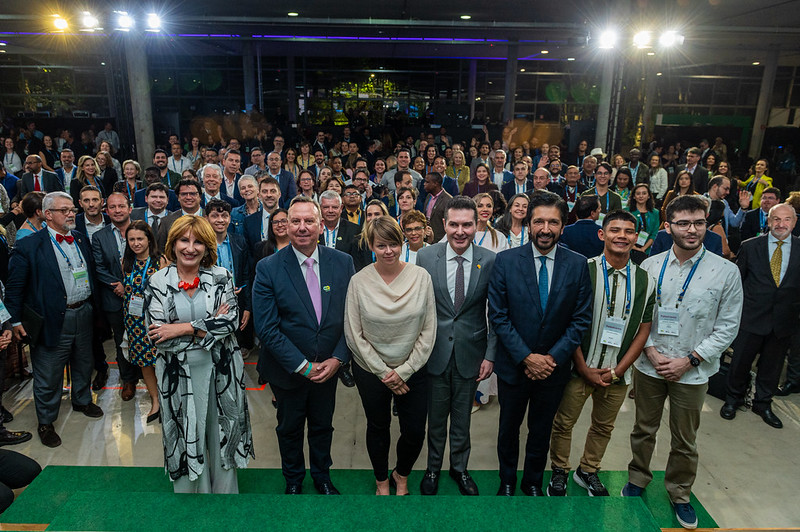
ICLEI - Local Governments for Sustainability
ICLEI engages at the local to global levels, shaping policy and sparking action to transform urban environments worldwide. We build connections across levels of government, sectors and stakeholder groups, sparking city-to-city, city-to-region, local-to-global and local-to-national connections. By linking subnational, national and global actors, policies, commitments and initiatives, ICLEI strengthens action at all levels, in support of sustainable urban development.
At the subnational level, ICLEI drives change along five interconnected pathways that cut across sectors and jurisdictional boundaries. This design enables local and regional governments to develop solutions in a holistic and integrated way, creating change across entire urban systems.
ICLEI’s Five Pathways Towards Sustainable Development
As a compass to direct our actions in a rapidly changing world and to transform our cities, towns and regions, we will drive action through five critical, strategic and interlinked Pathways: Equitable Development; Zero Emission Development; Nature-based Development; Circular Development and Resilient Development. These pathways are the basis for sustainable urban development.
The pathways provide a framework for designing integrated solutions that balance the patterns of human life and the built and natural environments. They encourage holistic thinking to ensure that ICLEI, as a network of local and regional governments and global experts, optimizes our impact. When these pathways guide local and regional development, urban systems become more sustainable.
Local and regional governments use these pathways as a guide for sustainable urban development through systemic change. Often, our activities are guided by a predominant pathway or set of pathways. In any given city or region, multiple activities may be implemented along each pathway. These activities help local and regional governments advance sustainable urban development.
For more information on ICLEI and our five sustainable development pathways please visit iclei.org.
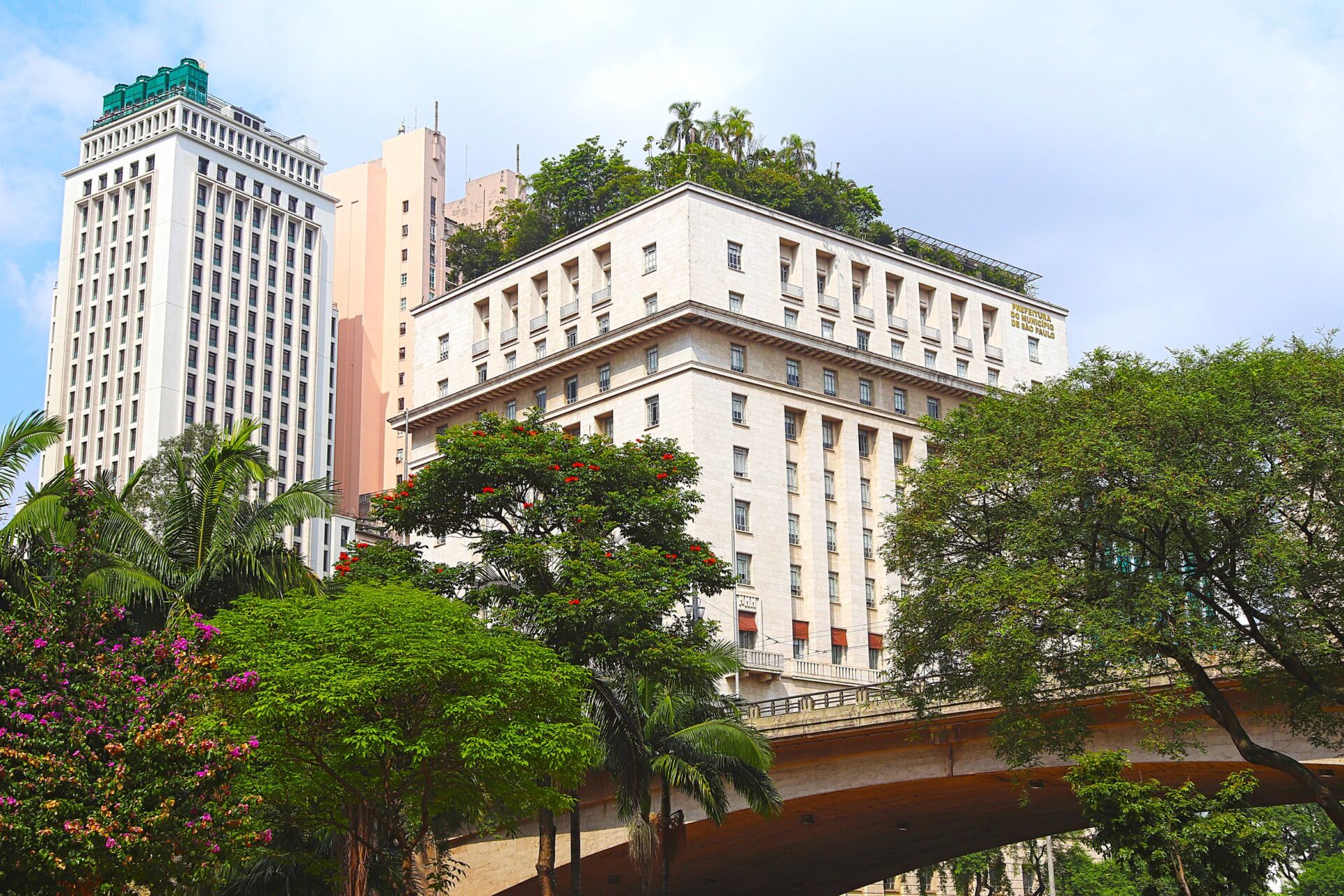
Our host: The City of São Paulo
The City of São Paulo, Brazil, has been an ICLEI Member since 1991 and served as the host city for the ICLEI World Congress 2024. It is the largest city in Brazil and all of South America, and serves as Brazil’s main economic and financial center. The City of São Paulo is home to over 12M residents, with more than 20M living in the Greater São Paulo metropolitan area.